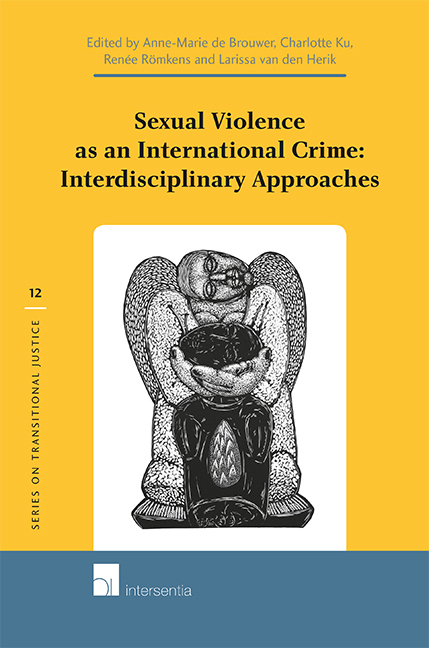Book contents
- Frontmatter
- Acknowledgements
- Foreword
- Contents
- Abbreviations
- INTRODUCTION
- PART 1 OVERVIEW OF SEVERAL MILESTONES AND CHALLENGES CONCERNING INTERNATIONAL CRIMINAL PROSECUTION OF SEXUAL VIOLENCE
- A HISTORICAL PERSPECTIVE, THE WAY FORWARD AND MILESTONES LONG OVERLOOKED
- THE INTERNATIONAL TRIBUNALS AND COURTS
- PART 2 SOCIAL, ARCHIVAL AND MEDICAL DATA COLLECTION AND ITS USE FOR THE CRIMINAL LAW PROCESS: METHODOLOGY ISSUES
- PART 3 SURVIVING SEXUAL VIOLENCE, STORY TELLING AND CREATING AWARENESS
- CONCLUDING REMARKS
- About the Contributors
Chapter 16 - Voices of Court Members: A Phenomenological Journey – The Prosecution of Rape and Sexual Violence at the International Criminal Tribunal for the Former Yugoslavia (ICTY) and the Bosnian War Crimes Court (BIH)
Published online by Cambridge University Press: 16 December 2020
- Frontmatter
- Acknowledgements
- Foreword
- Contents
- Abbreviations
- INTRODUCTION
- PART 1 OVERVIEW OF SEVERAL MILESTONES AND CHALLENGES CONCERNING INTERNATIONAL CRIMINAL PROSECUTION OF SEXUAL VIOLENCE
- A HISTORICAL PERSPECTIVE, THE WAY FORWARD AND MILESTONES LONG OVERLOOKED
- THE INTERNATIONAL TRIBUNALS AND COURTS
- PART 2 SOCIAL, ARCHIVAL AND MEDICAL DATA COLLECTION AND ITS USE FOR THE CRIMINAL LAW PROCESS: METHODOLOGY ISSUES
- PART 3 SURVIVING SEXUAL VIOLENCE, STORY TELLING AND CREATING AWARENESS
- CONCLUDING REMARKS
- About the Contributors
Summary
“You know, during my whole life I have been surrounded by love of women, firstly my mother, my grandmother, my aunts. As for aunts, I have many; then my daughters, I have two of them. That's why I don't make the difference between women and men. I don't even accept that division. I don't see a difference between men's perception of rape and women's perception of rape. What matters is our attitude towards women or the attitude of women towards men. It is just the way I see things. I’m not sure that any woman would have more sensitivity towards that matter than I do.”
Male Judge, BIH court (personal interview 2008).INTRODUCTION
Written from the point of view of a Clinical Psychologist, this chapter takes a social/psychological/phenomenological approach to the prosecution of rape and sexual violence in international courts. The central assumption is that the affective/cognitive/behavioural aspects of human beings determine to a large degree how we see the world, how we judge, how we think and, especially in this case, how court members and all actors perceive and react to rape. Attitudes towards rape survivors, and more broadly toward sexuality, as well as stereotypes of both the survivor and the perpetrator can and have affected the judgments of court members. Bias is frequently denied, and holders of such bias hide behind legalism and illusions of objectivity.
The discriminatory practices against women are the ever present context in this globalized world, and what takes place within courts is no exception. Feminist scholars, during the second wave of feminism, struggled to challenge the assumption that law is objective and uninfluenced by gender, race, class, personal beliefs, and country of origin. This continues to be an ongoing struggle. Considerable progress has been made in the recognition of rape as a war crime. Yet, in the actual practice of the prosecution of rape and sexual violence crimes, the personal/subjective nature of the law and the impact of the gender of its practitioners too often remain unexamined and unchallenged. This chapter presents the results of an emipirical study, based on interviews with a wide range of court officials at the International Criminal Tribunal for the former Yugoslavia (ICTY) in The Hague and the World Criminal Court (WCC) in Sarajevo. Central focus of this chapter is if/how gender-bias affects the prosecution of sexual violence in war and conflict situations.
- Type
- Chapter
- Information
- Publisher: IntersentiaPrint publication year: 2013



